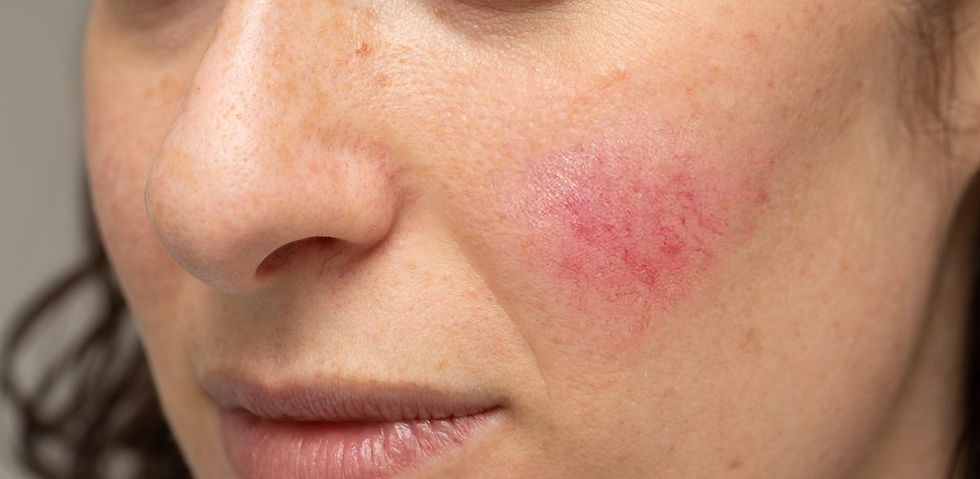Rosacea - What is it and what can I do about it?
- brooklyn532
- Jul 27, 2021
- 3 min read
Rosacea is a vascular skin condition that affects parts of the face, mainly nose, cheeks and/or forehead although it can appear on the chest and back. It is very common and affects 1 in 10 people in the UK mostly women from your 30s to 60s but it is less severe in women than men and is more common in fair-skinned than dark-skinned people.
Symptoms can include facial flushing, redness, spots, pustules (called acne rosacea), thickening of the skin, dry eyes, sore eyelids and rarely the front of the eye (the cornea). Not all symptoms occur in all cases and many cases are mild.
The cause of Rosacea is not known and but the following may contribute, sun damage, broken tiny blood vessels (capillaries) under the affected area may become abnormal or leaky, a tiny mite called Demodex which lives harmlessly on the skin of many people but is found in higher numbers in those with rosacea, abnormal immune reactions in the skin which can lead to inflammation and genetics may also contribute, as rosacea may run in some families. Lastly but very rarely long-term use of steroid cream on the face can cause a condition identical to rosacea but this is uncommon now since the danger of overusing steroid creams is well known and avoided. There is no specific investigation by GPs to diagnose this condition but often a blood test is carried out to exclude other problems that can cause facial redness.
Treatment of this condition is ongoing since there is no cure and there is nothing you can do to prevent it occurring except use sun protection, don’t drink alcohol excessively and keep your skin care simple and natural (no irritating chemicals).
So what to do to minimise symptoms and manage the condition? Firstly sunlight protection – All year round, use a broad spectrum SPF & UVA protector. SPF protects us from UVB (the UV that burns us and turns us brown) and UVA which is displayed as a star rating up to 5 stars ( this is the UV that goes deep down into the lower layers of the skin and ages us). Also be aware of common triggers that set off a rosacea flush or flare up, which are – extreme temperatures especially excessive heat, alcoholic drinks, strenuous exercise, stress, spicy food and hot drinks. Also harsh chemicals, cleansers containing acetone or alcohol, abrasive exfoliants, oil-based or waterproof make-up, perfumed sun blocks and those containing insect repellents. Try to only buy products for the face that are natural and contain no nasty chemicals or perfumes. Camouflage creams that have a hint of green can help cover and conceal broken veins and redness. You can have laser therapy that destroys the tiny capillaries but without damaging the surrounding tissue, but this is not usually available on the NHS. Antibiotic topically applied treatment creams for rosacea spots, pustules and cysts usually work but its not clear why since there is no germ bacteria that causes rosacea. Some antibiotic creams such as Metronidazole reduce inflammation as well as killing bacteria, this product works very well on calming down flare ups.
If you would like a private chat to discuss your rosacea and what to do about it give me a call. I have several products in the Monu Skincare range specifically developed by dermatologists to help with this condition. Monu is a skincare range made from pure natural ingredients and are cruelty free. Monu Recovery Balm Moisturiser is excellent for rosacea at just £32 for 50ml.

My number is 07812 731369. I hope this information has helped you or gives you information to pass on to any family or friends suffering from this condition. X


Comments